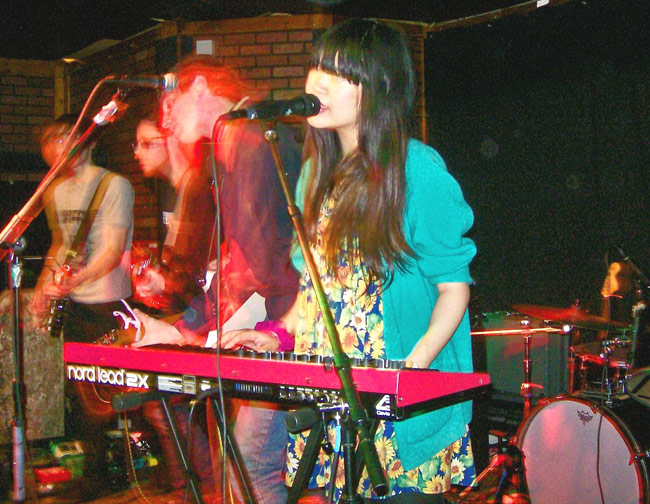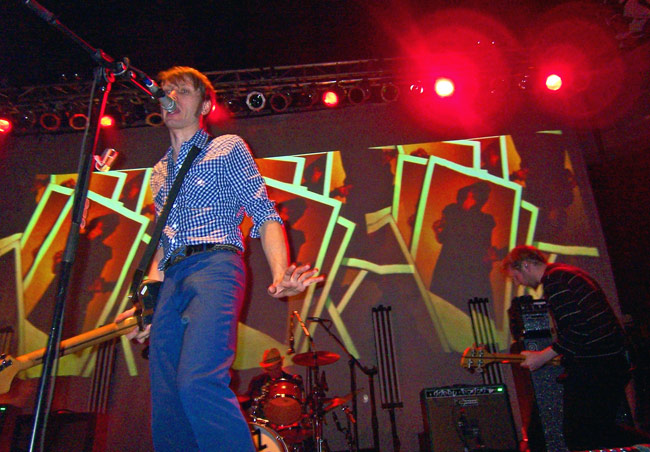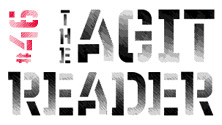
The Summit, Columbus, May 1
by Jennifer Farmer
It may have been a miserable, wet night outside, but inside the cramped, dark venue known as the Summit; it was anything but. The rain—though it placed quite a damper on Columbus’ plethora of fixed-gear riders—didn’t deter a sea of locals away from buzz band the Pains of Being Pure at Heart.
Admittedly, I was quite skeptical heading into this show. Despite the pretentious name, Pains are a genuinely warm and fuzzy listen, but their musical prowess leaves something to be desired. And it’s all too often that much-hyped bands have a hard time reproducing their sound live. Fortunately, the Pains, aside from a few minor technicalities, completely lived up to their reputation—and even had a sense of humor about it.
The venue remained mostly empty throughout much of local band Tin Armor’s set, but the crowd started piling in just as Brooklyn-based Zaza took the stage—and good thing they did, because they would have missed something surprisingly spectacular. Zaza’s set was an added bonus, an ethereal mix between Amnesiac-era Radiohead and Explosions in the Sky. It may have been a musical trance (or maybe the gorgeous female bassist), but before long, the crowd had surged forward and I found myself swaying along right near the front of the stage, wanting their set to last a few songs longer.
By the time the Pains actually took the stage, the place was abuzz with drunken excitement. It’s hard to imagine shoegaze as such a popular genre, but once they ripped through the opener, any and all doubts subsided. Their reverberating, noise-pop ballads turned chatter into singing, as they blazed through the incestually blissful “This Love Is Fucking Right!” The crowd could not have been more delighted, head-bopping and toe-tapping every second of the way.
Through the sea of gangly guys and girls—and there were a lot—I had a perfect keyhole view of guitarist/vocalist Kip Berman as he stared longingly into the distance. It was quite fitting for the music they play, but after 45 seconds of not blinking, it was borderline creepy. Then again, so are lyrics like, “You’re my sister, and this love is fucking right.” Though, maybe whilst staring into the void, he couldn’t see just how close his mouth was to the microphone, because the Pains’ lovably melancholic lyrics were rendered indistinguishable. However, when your whole genre of music relies heavily on distortion, I suppose the clarity of the lyrics doesn’t make much of a difference. Regardless of Berman’s proclivity for mouthing the microphone, the music was superb. The crowd, including my cynical self, ate it up readily, especially when Berman and Wang asked if anyone “knew of any good keggers” going on after the show. Gotta love college humor.
By the time the band walked off the side of the stage toward the bathroom for 10 seconds before the encore (encores are a bit strange when there’s not really anywhere to go), my feet were tired from tapping and my mouth sore from smiling. The Pains’ live show, just like their music, really is infectiously happy, and it was worth all 30 cold, rain-soaked minutes I spent on my long walk home from the venue, grinning the whole way.

Newport Music Hall, Columbus, May 2
by Kevin J. Elliott
Since the release of Tonight, I was in doubt as to whether or not Franz Ferdinand’s prolonged absence and new found club persuasions had put them slightly out of touch with the audience they originally wowed with their first two records. Did their paste-white boogie-punk parallel the extracurricular actions of the group? Rumor has it members of the band were living through their night owl personas the previous evening, catching a set by the Pains of Being Pure at Heart in Columbus. There a drunken local taunted Franz Ferdinand by telling them they ripped off Gang of Four, and he was subsequently put in a sleeper hold by bassist Bob Hardy before both were promptly removed from the bar. Apparently the Scottish know how to party.
There’s probably little reason for Alex Kapranos to deny listening to Entertainment repeatedly during his salad days. Gang of Four was a highly influential band, if only a bit surgical, sucking fun out of their sound in favor of form and function. I find no guilt on the part of Franz Ferdinand in this universal truth. Kapranos took his band one step further, though, adding a swagger and sophistication to their imagined art-punk histories to become worldwide rock stars.
The bigger-than-life status currently held by Franz Ferdinand was on display tenfold in front of a very enthusiastic capacity Newport crowd. It was the band’s first appearance in Columbus, and the fans they’ve accumulated in their short career seemed to come from all walks of life. It’s a testament to how well they do their jobs—even when the hipsters stop suckling from the nipple, there’s a soccer-mom and an iPhone owner waiting in the wings. But no matter the fanbase, Kapranos and company commanded the stage as if it were Wembley Stadium at times. Even with my refusal to enjoy their current slate of disco-inflected stomp, in the live setting, it’s apparent that songs like “Bite Hard” and the commercial-ready “No You Girls” were built around massive riffs and what the band refers to as “dirty pop.” In presenting Tonight, guitarist Nick McCarthy (who must be suffering from a broken something) manned a control center flanked with synths and added electro flutters when needed, never overpowering the heart of the group, namely the airtight rhythm section of Hardy and drummer Paul Thomson. An extended version of “Lucid Dreams” proved that in the finale, as the duo spread the beat to a maximum, inviting members of openers Born Ruffians to participate in the melee.
Still, it was Kapranos who is the star now, and he managed to humbly balance a genuine love for the crowd and a mood of elitism through a thorough set that included more catchy barbs than I can remember. “This Fire” and the ubiquitous “Take Me Out” were stand-outs, but lesser-knowns like “The Fallen” and “Ulysses,” meshed well in the overall groove of things. Unlike the bevy of British bands that tackle the States only to fizzle away due to lack of substance (I’m looking at you Arctic Monkeys), Franz Ferdinand seemed to have thrived in the wake by plying their original plans (which may or may not have been to ape Gang of Four) with the confidence that they had huge choruses built for huge stages, not huge egos.
Live reviews of Throbbing Gristle and Diplo
Dinosaur Jr. Live Review
Morrissey Live Review
Primal Scream Live Review
SXSW 2009 Wrap-up
Mötley Crüe Live Review
Tindersticks and Davila 666 Live Reviews
Matt and Kim Live Review
Fest Guide '09
Antony and the Johnsons Live Review
I Hate New Music by Dave Thompson
Cursive Live Review
Girl Talk Live Review
The Pigfuck Top 10
